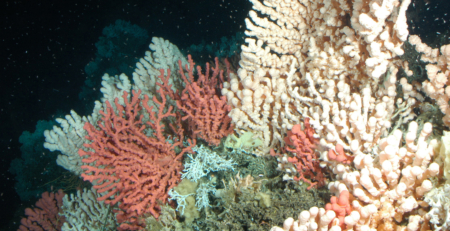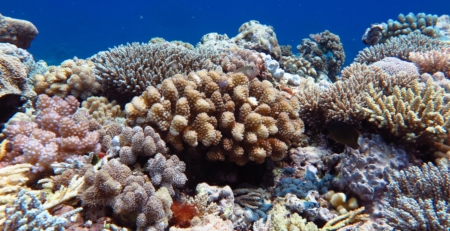A sea cucumber a day keeps the coral doctor away
By Carly E. Karrick
Do you think an apple a day keeps the doctor away? What about a cucumber, or maybe even a sea cucumber? Sea cucumbers are animals related to sea stars that filter coral reef sediment, which is the solid material on the bottom of a reef. They have long been recognized as a source of food and medicine for humans, but sea cucumbers have recently gained recognition for the ways in which they help corals, the main architects of coral reefs. A recent study conducted by researchers at the Georgia Institute of Technology (Atlanta, Georgia, USA) demonstrated the importance of sea cucumbers for coral health.
Sea cucumbers (Holothuria atra), shown at the bottom of this image, filter reef sediment (photo: Clements et al., 2024).
Coral diseases can be spread in reef sediment
Coral diseases have killed a lot of corals over the past few decades. Some coral diseases can spread in reef sediment [1]. For example, tiny things living in sand like bacteria can spread to other corals in sediment. Some corals, like Acroporids (corals in the genus Acropora), are really vulnerable to disease transmission through sediment because they grow thickets that come into direct contact with the sediment.

A thicket of Acropora pulchra corals growing directly on reef sediment in Mo’orea, French Polynesia (photo: Carly E. Karrick).
Sea cucumbers can clean reef sediment
Despite their vegetable-sounding name, sea cucumbers are animals related to sea stars. Sea cucumbers eat bacteria, tiny algae, and organic material from sediment. Then, they deposit “cleaned” sediment on a reef that doesn’t contain these things. In the case of coral disease, Cody Clements, a researcher from Mark Hay’s lab at the Georgia Institute of Technology, hypothesized that sea cucumbers could remove disease-causing bacteria from reef sediment. Their recent study tested this hypothesis in Mo’orea, French Polynesia, and Palmyra Atoll.
How do sea cucumbers affect coral disease?
To understand how sea cucumbers affect coral health, the research team did experiments removing sea cucumbers from patches of reefs in Mo’orea, French Polynesia, and Palmyra Atoll. They compared the percentage of diseased and/or dead corals in 10 patches without sea cucumbers to 10 patches with sea cucumbers.
Sea cucumbers reduce coral disease
The researchers found that sea cucumbers reduce coral disease in corals in contact with sediment (like Acropora pulchra). Without sea cucumbers, coral tissue mortality increased by ~370% and whole-coral death increased by ~1500%. This means that sea cucumbers reduce the risk of coral disease and death!
The researchers found that reef patches with sea cucumbers (yellow/right) had a lower percentage of coral tissue death than patches without sea cucumbers (purple/left). The inset on the right shows Acropora pulchra tissue death, where the coral looks white at the bottom (figure: Clements et al., 2024).
We should protect sea cucumbers!
Because sea cucumbers are so important for coral health, it’s really important to protect them. Historically, sea cucumbers are overharvested. For example, sea cucumber harvesting in Mo’orea led to the complete loss of many sea cucumber species. While other species like Holothuria atra remain, we should work to protect these valuable animals. Similarly, we should protect other reef species that are important for coral and reef health.
Read the full article here: Clements, C.S., Pratte, Z.A., Stewart, F.J., and Hay, M.E. (2024). Removal of detritivore sea cucumbers from reefs increases coral disease. Nature Communications, 15: 1338. https://doi.org/10.1038/s41467-024-45730-0
References
[1] Studivan, M.S., Rossin, A.M., Rubin, E., Soderberg, N., Holstein, D.M., and Enochs, I.C. (2022). Reef sediments can act as a stony coral tissue loss disease vector. Frontiers in Marine Science, 8. https://doi.org/10.3389/fmars.2021.815698











